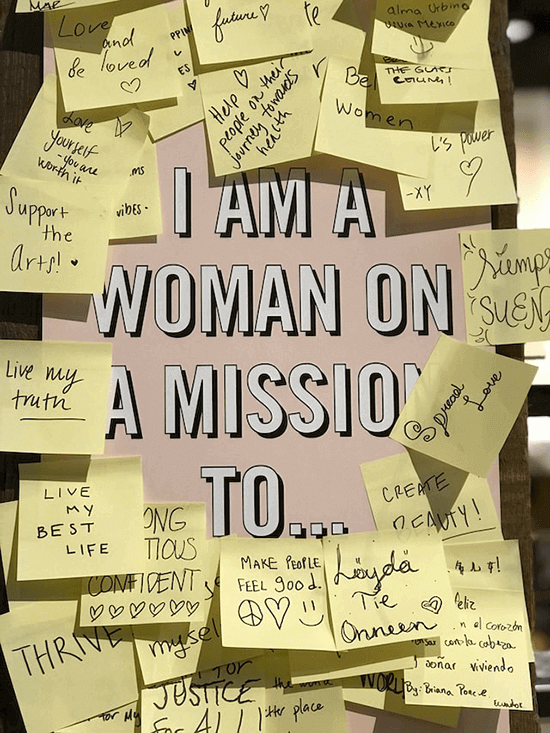Girlhood and finding empowerment in female spaces
For the first decade of my life, I spent most of the hours in my tiny apartment waiting for the chance to meet with my friends– three girls, about the same age as me, who shared my quintessential “girly” interests.
We each played a unique role in our little barkada—I considered myself the adventurous one, always eager for one more round of “Ice Ice Water.” I liked having friends who shared their unique interests with me, showing me their quirks and nuances and convincing me to love them, too. We confided our deepest secrets with one another, the most sacred matters with which a group of pre-tweens could be faced. We taught each other how to do makeup, how to talk to boys, how to dress.
One of the people from that friend group invited me to join something called the Sapphire Girls Club. It was essentially a group of little girls accompanied by their mothers doing activities together, from learning how to bake simple treats to crafting pink-and-purple friendship bracelets. Mostly, we talked. I adored it. In spaces like this, steeped in femininity and the openness that came with it, my girlhood began.

I developed a core part of my identity based on my gender. This was further exacerbated when I realized that I always felt more comfortable around other women. I always felt that I had to calculate my actions around boys––maybe it’s because I wasn’t the most attractive girl in any of my friend groups or because I developed crushes at the drop of a hat. Either way, my all-girls spaces were a break from that.
Sometimes, I questioned if my proclivity towards an all-girls environment made me sheltered. I didn’t know how to maneuver around people other than the small girl group I claimed at six years old. Everything changed when I grew out of kindergarten and moved to an all-girls Catholic school that was a blank slate for myself and others. I had to go through the terrifying and arduous process of tapping people on the back and saying, “Hi, I’m Maya. Do you want to be my friend?”
We are undeniably shaped by our girlhood and the spaces it fills and forms. We may grow out of these female spaces, but to me, they will always be a home for the little girl inside of me to come back to, even if she can only come back to them in her memory of lipstick, classroom politics, and first feelings. In this regard, and many others, girlhood lasts forever.
My previous female environments were small spaces where I knew everyone by name; I didn’t have to ask how to put my hair in a bun or knot a bracelet –– when someone saw me struggling, they hurried over to help. This new female space was scary and unfamiliar, and I began to worry that I wouldn’t fit in as I did at home.

After many years of awkward introductions and messy friendships, I settled into my niches. I realized that while the whole school could not be the female environment I wanted, there were many spaces where I could find the same support and openness that helped me thrive in my small friend group years ago.
I joined the debate team as a wide-eyed freshman, expecting a group of merciless opponents who wouldn’t hesitate to point out my shortcomings. I found exactly that: a team of fierce women who were ruthless in adjudicating my skills. I learned that I talked too fast, used debate terms I didn’t understand, and was terrible at discussing international relations. I learned to appreciate honest criticism and recognize it as a sign that someone loves you enough to skip the coat of sugar if it means you’ll get to where you want to be.
When my teammates weren’t arguing on the bench opposing mine, they were gossiping about our debate crushes or staying up with me at 2 a.m. the night before our early-morning competitions. While we taught and criticized each other internally, we were one unit outside our metaphorical training room. I was thrilled to be the only all-girl team in a “break” round or to beat an all-male team. We laughed and cried together, we found growth in each other’s openness.

Outside of the debate team, I found other female spaces that taught me more about feminism, girlhood, and growing within female spaces. As I grew into these spaces, my previous worries about being sheltered fell away. In a sort of juvenile way, I thought the entire world was like that. I was never exposed to sexism in an academic environment, and I was never taught that a woman was anything less than a man. In that regard, perhaps I was sheltered. However, I never had any sort of rude awakening.
Because of how deeply immersed I was in female spaces, all of the smartest, bravest, kindest, and most ambitious people I knew were women. At the same time, these women were the most “real” people I knew. In between org meetings and exams, we would gossip about our ridiculous crushes or cry over trivial things. The influence of these girls was invaluable: growing up around successful women who embodied all of the stereotypical “girly” attributes allowed me to love those traits within myself. I learned that they can co-exist. I can be dramatic and insecure while being intelligent, brave, and beautiful.

Now that I’m in the middle of my senior year of high school, I’ve realized how deeply these female spaces impacted me. Home, the classroom, the playground, and everywhere in between and after––my whole life, I have been steeped in femininity. While that came with its pitfalls, I’ve emerged from those spaces a stronger and more secure woman with an amazing support system of girls. I believe that every little girl deserves and needs a group of friends to grow through life with her. Of course, that friend group could comprise members of any gender. However, until we’ve built a culture that doesn’t polarize boys and girls from birth, whether by destigmatizing “girly” things or dismantling the way gender roles are taught to children, we need to provide girls with spaces to be themselves.
We are undeniably shaped by our girlhood and the spaces it fills and forms. We may grow out of these female spaces, but to me, they will always be a home for the little girl inside of me to come back to, even if she can only come back to them in her memory of lipstick, classroom politics, and first feelings. In this regard, and many others, girlhood lasts forever.


